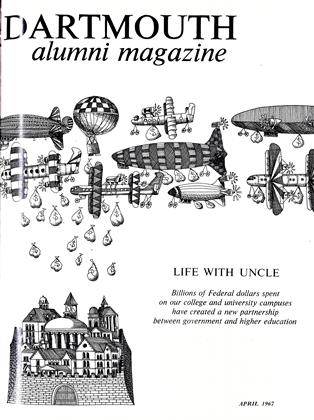By Profs.Roger H. Davidson (Government), DavidM. Kovenock (Government), and MichaelO'Leary (formerly at Dartmouth). Belmont,Calif.: Wadsworth Publishing Co.,Inc., 1966. 224 pp. Paperbound $2.60.
The last year has not been good for the image of Congress. Adam Clayton Powell in the House and Thomas Dodd in the Senate have been much in the news for alleged privilege abuses, columnists have taken to chronicling the junkets and hiring practices of other legislators, and the voice of the finger-wagger is heard in the land.
Three young political scientists - Roger H. Davidson and David M. Kovenock of the Dartmouth Government Department and Michael I. O'Leary of Syracuse University, formerly of Dartmouth - have written a book that brings these things to mind, although the book was not written with those specific news items at hand.
The book is entitled "Congress in Crisis: Politics and Congressional Reform." It is part of an academic series called "New Frontiers in American Politics."
The academic sound of the series and the textbook layout of the chapters should not frighten away lay politicians. They would enjoy the book; they would profit from it, too, just as the undergraduates and graduate students will in the classroom.
The beauty of the work is the "shirt sleeves" approach the authors have taken. They spent a great amount of time talking with Congressmen, with Congressional aides, and with those members of the working press who cover Capitol Hill.
They distill their penetrating findings into concise prose. Starting from the observation that "the other two branches of our government have nothing quite comparable to the public image of Senator Snort, the florid and incompetent windbag," the book progresses through an examination of the subject to conclusions that include a belief that Congress still has a vitality that serves the people and that keeps our system one of three parts.
The authors find that "Congress is no longer the chief maker of laws in our political system," but that our national legislature has important tasks to perform. These tasks, as they see them, are at least four: "legitimization, policy clarification, oversight, and constituent service."
The first means approving acts and policies of the Administration, oversight refers to checking up on the activities of Administration agencies, and the other two should be self-evident.
The book, on balance, is exceptionally good. It deserves a wider audience than its present publication indicates it will receive. The scholarship is thorough, the presentation is orderly, and the conclusions are incisive and well thought out.
Now Associate in Developmentat the College. Mr. Martinwas formerly legislativeassistant to Congressman RoyH. McVicker (D.-Colo.)
 View Full Issue
View Full Issue
More From This Issue
-
 Feature
FeatureLife with Uncle
April 1967 -
 Feature
FeatureDICK'S HOUSE
April 1967 -
 Feature
FeatureUNCLE SAM AT DARTMOUTH
April 1967 By C. E. W. -
 Article
ArticleThe Undergraduate Chair
April 1967 By ART HAUPT '67 -
 Article
ArticleEloquence at Gettysburg and Daniel Webster
April 1967 By EARL W. WILEY '08 -
 Class Notes
Class Notes1920
April 1967 By MACOMBER, JOHN s. MAYER
DAVID K. MARTIN '54
Books
-
 Books
BooksAlumni Articles
MAY 1967 -
 Books
BooksTHE BEGINNINGS OF TO-MORROW
May 1933 By Erville B. Woods -
 Books
BooksA MATTER OF CHOICE.
DECEMBER 1968 By JOHN HURD '21 -
 Books
BooksPop Fiction
MARCH|APRIL 2019 By JULIA M. KLEIN -
 Books
BooksARTISTS OF THE OLD WEST.
JANUARY 1968 By ROBERT E. RIEGEL -
 Books
BooksHEALTH FOR THE HAVING
March 1944 By Rolf C. Syvertsen '18



